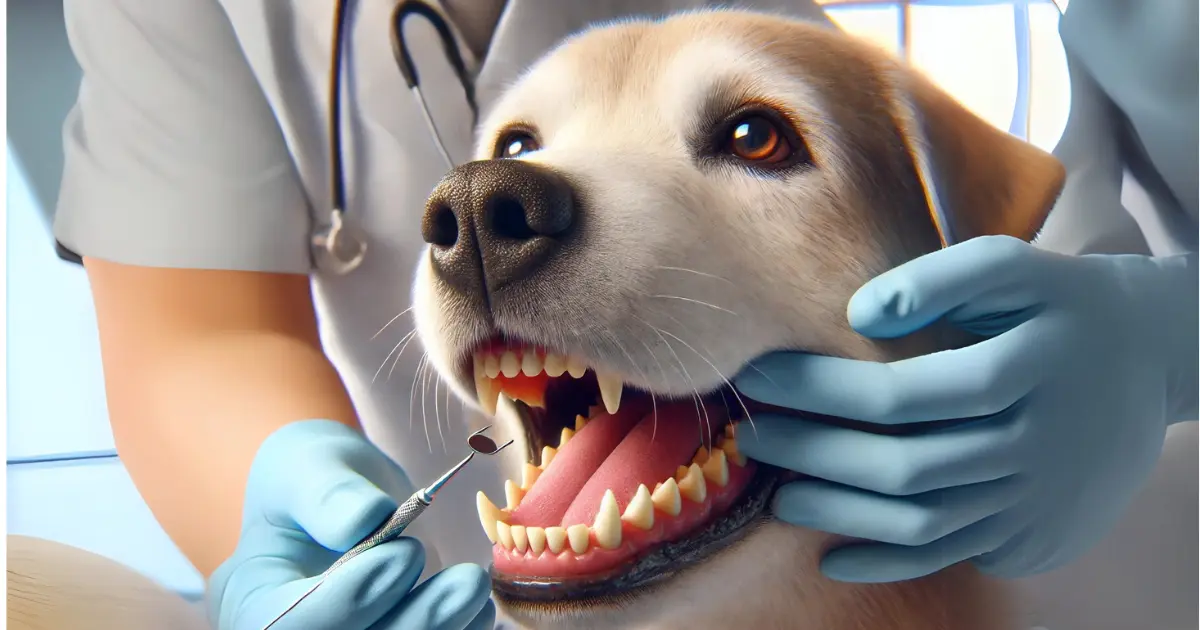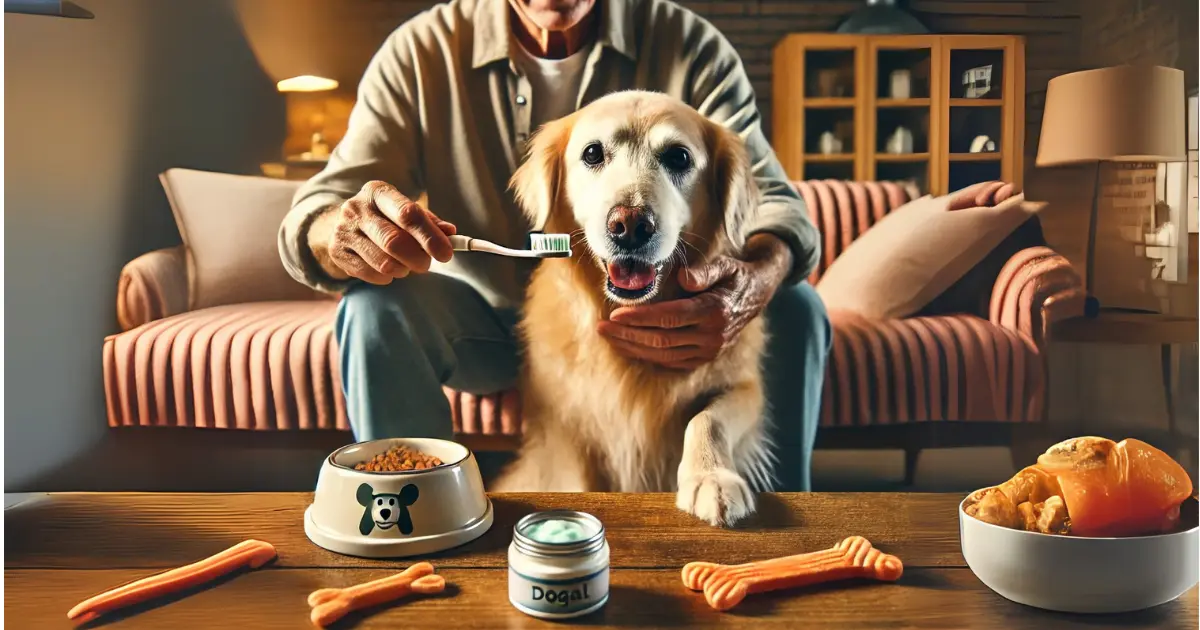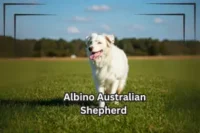The Ultimate Guide to Keeping Your Senior Dog’s Smile Healthy
Published: 28 Jan 2025
Today, let’s talk about our furry friends growing older and how we can ensure they live their best lives. One often overlooked aspect of aging dogs is their dental health, significantly affecting their overall well-being. I felt overwhelmed when I first realized how crucial senior dog dental care was for my dog. However, I quickly learned that extra care can make a big difference—and it’s absolutely worth it. If you have a senior dog, now is the perfect time to give their teeth the attention they deserve so they can enjoy their golden years with comfort and happiness.

Table of Contents
Why Dental Care Matters for Senior Dogs
I know “doggy breath” isn’t glamorous, but it’s not just about keeping their breath fresh. Poor oral health can lead to more significant issues affecting their comfort and happiness. Here’s why you should care about your dog’s teeth:
- That “dog breath,” you know and love, might be a sign of persistent bad breath.
- Gum infections, inflammation, and painful teeth can make it hard for your dog to enjoy their food.
- Missing or damaged teeth can hurt your dog and make it tough to chew.
- Did you know that untreated oral problems can bring out infections that can spread to the heart or kidneys?
It sounds scary, but trust me, you can avoid all these problems with a bit of attention to your oral health. Think of it like your own dental routine—brushing, cleaning every now and then, and being aware of the signs when something’s off.
Common Dental Issues in Older Dogs
As your dog ages, you might start noticing changes in their mouth. Don’t worry; this is common! Here are some things to look out for based on my own experience:
1. Plaque and Tartar
Before I started brushing regularly, my dog had a bit of plaque buildup, and I didn’t realize how much it could affect its gums—plaque forms a sticky film of bacteria that develops over time. If not cleaned, it hardens into tartar, making gums swell, causing pain, and even leading to tooth decay. Regular brushing helped us avoid some serious problems.It’s just one of many fascinating dog facts that highlight the importance of proper care.
2. Gum Disease (Periodontal Disease)
Red, swollen, or bleeding gums are a big red flag. I remember feeling terrible when I saw my dog’s gums bleed a bit while I was brushing. It indicated early gum disease, which can cause pain and, if ignored, may result in tooth loss. If you notice these signs, definitely check with your vet.
3. Tooth Decay
It can happen to older dogs just like it does to humans. Cavities or tooth damage can cause pain, and no one wants their dog to suffer. I always recommend checking their teeth at least once weekly to spot early signs of decay.
4. Tooth Loss
My dog started losing teeth as they got older, and while it wasn’t ideal, it didn’t stop them from enjoying meals. If your dog starts to lose teeth, it’s usually because of severe dental disease. Make sure they get checked regularly to avoid any extra discomfort.
5. Oral Tumors
I remember getting nervous when I noticed a lump in my dog’s mouth. Luckily, it was nothing serious, but oral tumors are more common in senior dogs. Keeping an eye out for any growth can help catch potential issues early.
Do Older Dogs Need Professional Teeth Cleaning?
The first time I heard about professional cleanings, I was skeptical. However, after talking to my vet, I realized how essential they are for older dogs. Professional cleanings can remove tartar and address hidden issues, like gum disease, that may not be visible.
Don’t worry—your dog will be sedated during the cleaning, so it’s totally safe. And when it’s done, you’ll see just how much healthier their mouth looks. I personally saw such a big difference after my dog had its first cleaning—it was like a weight had been lifted off their teeth! Always talk to your vet if you’re unsure whether it’s the right time for a cleaning.
Signs Your Senior Dog Needs Dental Care
Sometimes, it’s easy to miss the signs that your dog needs dental care. I’ve overlooked a few things before, so here are the red flags to watch for:
- Chewing may become difficult, or your dog may favor one side of their mouth.
- Excessive drooling, which could be a sign of pain
- Pawing at the mouth or face, which might mean something’s bothering them
- Swollen or bleeding gums (don’t ignore this one)
- Missing or loose teeth
- Bad breath that doesn’t go away (and I mean bad)
If you see any of these symptoms, don’t wait—schedule a vet visit. The sooner you catch it, the sooner your dog can return to its happy, healthy self.

How to Keep Your Senior Dog’s Teeth Healthy
Here’s where things get practical. I know you’re busy (who isn’t?), but taking care of your dog’s teeth doesn’t have to be a huge chore. For more insights on keeping your furry friend happy, check out these dog care tips. Here’s what worked for me:
1. Brush Their Teeth Daily
I didn’t start brushing my dog’s teeth daily until I noticed some tartar buildup. But once I got into the habit, it became part of our daily routine. It makes a huge difference in keeping their teeth clean and healthy. I use a soft-bristled toothbrush and dog-safe toothpaste, and after a few days, my dog started to get used to it. (Pro tip: be patient—it might take a while before they’re comfortable.)
2. Give Dental Treats and Chews
I love giving my dog a dental chew after meals—it’s like a treat and helps clean their teeth at the same time. Just be sure to choose chews that are approved by veterinary dental associations. They’re safe and effective!
3. Regular Vet Checkups
Even though I brush daily and give dental chews, I still ensure my dog gets a vet checkup every six months. It’s a good opportunity to catch anything that might have slipped past me, and I’ve always felt reassured after these visits.
4. Feed Dental-Friendly Foods
My vet recommended dental-specific dog food, which helps reduce plaque buildup. You can also explore natural options like adding coconut oil for dogs, which can promote oral health and freshen their breath. If you’re not sure what food to get, don’t hesitate to ask your vet—they’ll know what’s best for your dog’s needs.
Is Dental Cleaning Safe for Older Dogs?
I know the idea of your senior dog getting a cleaning under anesthesia can be a little worrying, but trust me—it’s generally very safe, especially if your dog is in good health. My dog had a cleaning at 9 years old, and they handled it like a champ. Before the procedure, your vet will do a thorough health check to ensure everything is in order so you can feel confident.
What If My Dog Needs a Tooth Extraction?
I won’t lie—I was nervous when my dog had to get a tooth extracted. However, the vet reassured me that it would help my dog feel better and prevent more pain. After the procedure, my dog bounced back quickly and seemed so much more comfortable. If your dog needs a tooth extraction, it’s often for their good, so don’t hesitate to follow the vet through every step of the process and give aftercare instructions to ensure proper healing.
Final Thoughts
Caring for your senior dog related to health issues or dental care ensures their later years are as joyful as possible. It might initially feel overwhelming, but a little daily attention can make a huge difference. Whether brushing their teeth daily or scheduling a professional cleaning now and then, you’ll quickly see how much it enhances your dog’s comfort and overall well-being. Always contact your vet for guidance if you have any doubts or questions. They’re there to help you—and your dog!
Aside from dental care, keeping your senior dog healthy involves addressing their overall needs, like mobility and joint support. For tips on senior dog health and wellness, check out the American Kennel Club’s guide to senior dogs.”
Quick Recap
- Brush your dog’s teeth daily (yes, really!)
- Give dental chews to help maintain clean teeth.
- Schedule regular vet checkups and professional cleanings.
- Feed dental-friendly food to support their oral health.
- Keep an eye out for signs of dental trouble and act quickly.
By following these tips, you’ll help your senior dog enjoy a healthier, happier life—and keep that tail wagging for years to come.
FAQ
can I help my senior dog stay calm during tooth care?
Begin by slowly introducing the tools—let them sniff the toothbrush and toothpaste first. Use soothing tones, take breaks if needed, and always end with a reward they love.
My senior dog struggles with chewing; are there alternatives to dental chews?
You can use dental powders or water additives that promote oral hygiene without chewing. Gently wiping their teeth with dog-safe dental wipes is another effective option.
Are there signs of gum problems I might overlook?
Pale or receding gums are subtle signs often missed but can indicate more profound issues. When inspecting your dog’s mouth, check for gum texture or color changes.
Can homemade diets affect my dog’s dental health?
Yes, homemade diets often lack the crunch that helps clean teeth naturally. Raw vegetables like carrots can be added to meals for a gentle abrasive effect that can help reduce plaque.
How can I make professional dental cleanings less stressful for my senior dog?
Schedule the cleaning early in the day to minimize waiting time and anxiety. Bring a familiar blanket or toy for comfort during the vet visit.
Is mouth pain always visible in senior dogs?
Not necessarily; dogs are good at masking discomfort. Look for indirect signs, like head shaking, slower eating, or avoiding certain textures.
How do I clean tartar from my dog’s teeth at home safely?
Avoid using sharp tools at home; instead, opt for enzymatic toothpaste and brushes designed for pets. Consistent brushing can soften and eventually reduce tartar over time.
Can switching their water improve dental health?
Yes, adding vet-approved dental solutions to their drinking water can help reduce bacterial growth. It’s an effortless way to supplement their oral care routine.
Are there specific dog breeds more prone to dental tumors?
Yes, breeds like Boxers and golden retrievers are more likely to develop oral tumors. Regular checks and cleanings are critical for early detection in such breeds.
What’s a natural way to maintain my dog’s fresh breath?
Feeding parsley in small amounts can naturally freshen their breath. Regular cleaning and dental treats also help keep their mouths odor-free.

- Be Respectful
- Stay Relevant
- Stay Positive
- True Feedback
- Encourage Discussion
- Avoid Spamming
- No Fake News
- Don't Copy-Paste
- No Personal Attacks



- Be Respectful
- Stay Relevant
- Stay Positive
- True Feedback
- Encourage Discussion
- Avoid Spamming
- No Fake News
- Don't Copy-Paste
- No Personal Attacks





